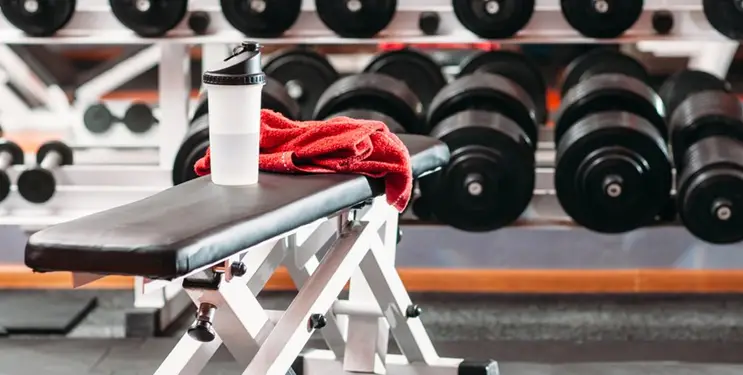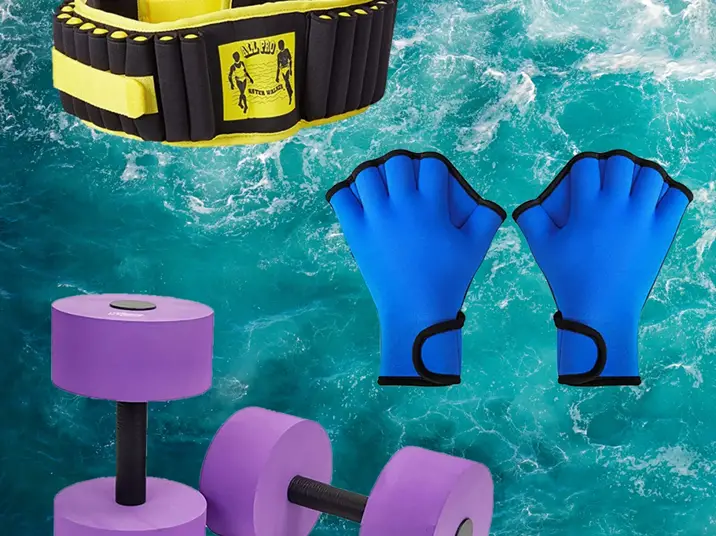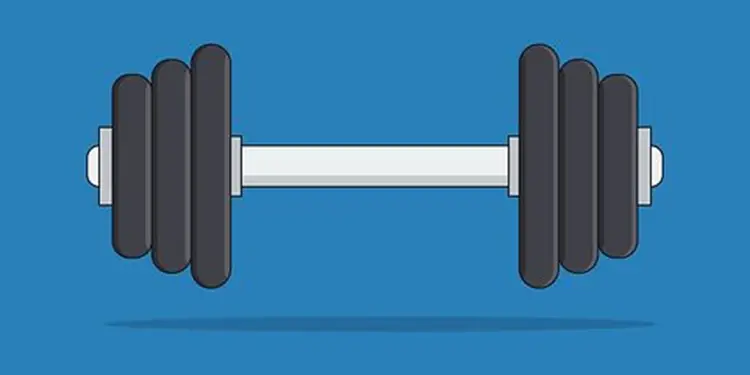Weights are often used in gym settings or to exercise at home. We all want them to look nice and shiny, but they will slowly accumulate rust over time. Luckily there is a way to remove rust from rusty dumbbells and barbells! Keep reading for some great ideas on how you can clean rusty weights!
You just dropped a pretty good chunk of cash on some gym equipment, and now you want to keep the rust and dust far away. Many people do not think they can do that. However, a simple nylon /brass brush with vinegar can add spark to rusty weights and make them sparkle again.
According to the New York Times, consumers spend an estimated $4 billion on home treadmills, stationary bikes, StairMasters, and other equipment that ends up gathering rust and dust.
This may be discouraging. However, do not let the rust stop you from working out or having your fancy home gym. This guide will show you how to get rusty weights – dumbbell, squat rank, or kettlebell – close to looking new.
What You Need (Items)
- Brush
- Water
- Vinegar
- Cleaning (bucket or tub)
- Paint
- Oil (optional)
Best Ways to Clean Rusty Weights: Step by Step
1. Remove Dust

Start by wiping dust off the equipment. Most people use a dry cloth. However, a brush is highly recommended. Removing dust from your kettlebell /dumbbell using a brass brush is less likely to cause damages to your workout equipment.
2. Soak Rusty Weights in Water

Mix water in a large container or tub and add white vinegar. Soaking your rusty weights in a vinegar solution will remove the rust faster. There is one way of doing this:
- First, disassemble the dumbbell or barbell
- Place the weighted equipment in a tub or container. Fill the tub with white vinegar until the equipment is completely submerged.
- Soak overnight. You can also extend the hours. Vinegar helps to remove inbuilt corrosion.
3. Scrub If Off

Now that your workout equipment is all soaked in vinegar, it is time for a scrub job. Here is how:
- Scrub the equipment using a nylon or brass brush. This step is very crucial
- Once you take your equipment out of the vinegar solution, you only got a few minutes to get the vinegar rinsed off to prevent flash rust from re-appearing
- Prepare a solution that contains a mixture of water and a pinch of baking soda. Spray this on your rusty weights to prevent flash rusting
- Scrub off this spray with a nylon or brass brush and rinse off with clean water
4. Dry the Equipment
This step is important because it will remove moisture to avoid re-rust. Dry your equipment using a dry towel or cotton cloth.
5. Repaint the Equipment

Repaint your rusty weights. If you lack paint, you can use oil. Begin by:
- Wiping the equipment with a dry towel/cloth
- Use oil spray and apply a few drops to a section on the workout equipment. Brush thoroughly
- Use a wire wheel attachment on your cordless drill if you really want it to be as shiny.
Using WD-40 to Clean Rusty Weights
WD-40 is one of the most useful pieces of home equipment for rust removal. If you are not familiar with WD-40, it is a water-displacing spray used to remove dirt and grime from hard-to-reach places. It also acts as a lubricant on things like squeaky hinges or rusted metal surfaces.
Using this miracle product frequently will keep your home looking new and running smoothly. When cleaning rusty weights, all you need to do is spray your dumbbells using WD-40, let them sit for about 3 minutes, then wipe them down! The rust should come right off!
WD-40 can also be used to prevent rust from forming on weights by spraying it on and wiping it off.
Using Dish Soap to Clean Rusty Weights
One of the best ways to remove rust from dumbbells is by using dish soap. Dish soap is a cleaning product that contains degreasers, which break down and remove oil and grease. A degreaser also breaks down rust and corrosion and usually comes in the form of a gel or cream.
Using Hydrogen Peroxide to Clean Rusty Weights
For dumbbells that are not rusty but dirty instead, hydrogen peroxide will do the trick. To clean dumbbells with hydrogen peroxide, first, wipe them down using a wet rag to get rid of any big droplets of sweat or other debris on them.
Next, mix 5% hydrogen peroxide with 95% water (for example, mix 1 cup of each if you have 10 lbs weights). This should give you enough solution for all your dumbbells for one application. Soak rusty weights overnight in this solution, then take them out and wipe them down for a cleaner look that will last longer!
What Makes Your Weights Rust (Causes)?

Too Much Moisture
The main reason that dumbbells and barbells rust is that they are constantly in contact with moisture. When the weather is humid, or when you work out and sweat, the metal will start to corrode over time.
Some dumbbells have a higher resistance to corrosion, so you might want to invest in those if rust is a problem for you. Many dumbbells will come with a coating on them, which decreases the amount of moisture they are exposed to. This reduces the chances of them corroding over time!
Not controlling humidity levels will make your dumbbell rust. You are also most likely to find mold, which is something you do not want happening.
2. Rain and Snow
Rain is another problem that can make weighted equipment rust, especially during outdoor sessions. During an outdoor gym setup, it is hard to control rain pour and humidity.
Indoor workout equipment such as the Fitlaya Ab Machine is a smart device that comes with a complete LCD monitor for calories or reps count and encourages fitness in a fun yet effective way to tone muscles and shape your body.
3. Proximity to the Sea
According to research on corrosion of metals in the tropics, metals can increase rusting up to 50 miles inland. If you live closer to the sea/ocean, you may notice that most workout items are prone to stickiness because of saltiness.
If you live near the ocean, your dumbbells might rust faster than someone who lives further inland. The salt in the air speeds up corrosion and can make rusty weights a more common sight.
4. Weights That are Stored in Direct Sunlight
Sunlight speeds up corrosion, so dumbbells stored outside will corrode faster than dumbbells kept indoors. Many dumbbell sets come with a case, so you can easily store them out of sight to reduce this problem!
How to Take Care of Your Workout Equipment
1. Repaint Your Equipment

Most gym pieces of equipment come painted, but after a few sessions, that paint wears off, increasing the chances of rusting. While many manufacturers do not include spray paint in their purchases, you can prevent rusting by storing your workout equipment in a dry, cool place.
Make sure you do maintenance by oiling and repainting. You can use a Rust-Oleum paint specifically made for metal. This will help seal the metal and prevent moisture from getting in, slowing down the corrosion process.
2. Disinfect Regularly
Just as you clean up leather seats with disinfectant, workout equipment such as barbells, dumbbells, squat rack, ab rollers all need the same love. Here is how:
- Give your equipment extra care with oil occasionally
- Clean it at least once a week
- If you have a piece of indoor equipment like a squat rack or a power rack, drill enough drain holes in the bottom to keep water away
- If possible, galvanize steel-framed equipment
3. Dehumidify
If you lack air conditioning for your indoor-house gym, you can prevent rusting by treating your air with a dehumidifier. A dehumidifier will make the room air hotter while running and has a limited capacity of water it can hold. This approach can only be sustainable long-term for someone with humidity issues in their house.
Pure gym suggests that maintaining the proper indoor humidity level is essential in any indoor space but is particularly important when dealing with significant investments such as wooden gym floors in schools, at home, and other locations.
Home gyms are susceptible to changes caused by changes in the weather, making it more important to be proactive in protecting your workout equipment. What works in the winter may necessarily not be the right action in the summer.
4. Clean Up Sweat After Workout
Sweat is moisture and salt mixed together. If you are working out and sweating all over your workout equipment, you will increase the rusting process. Keeping your equipment always wiped after every workout session will help prevent rust from building up.
5. Improve Your Storage
This is important if you have quality resistance bands and a few expensive weights, such as barbells, that you may want to keep away from rusting. Also, if you have extra space in your room, take your equipment into the house after your workouts.
Workout tools such as dumbbells, kettlebells, and ab rollers are prone to rust, and keeping them in a space with great humidity control will go a long way to preserving your equipment.
Frequently Asked Questions
How can I prevent dumbbell rust apart from painting?
If you cannot paint, coat your workout dumbbell and other exposed metal surfaces in oil. Oiling can prevent rust. You can use WD-40, 3 in 1 Oil, or any other light oil that you may have on hand. This will help keep the metal from corroding and make them easier to clean the next time you use them. Be sure to wipe off any excess oil before using them, as this could make the weights slippery.
What is the best way of preventing rust?
If your workout area is really air-conditioned, you will never notice any rusting. It is best to keep dumbbells stored in a dry, dark place. If you have the space, keeping dumbbells on an upper shelf will ensure they stay away from moisture and sunlight.
If there is no room for this or if your dumbbell set does not fit up high, it is okay to stack dumbbells on the floor but make sure they are pushed all the way against the wall so that there is no hallway between them.
This will help prevent moisture from sneaking into cracks where weights could rust. Never pile more than 5-10 dumbbell sets on top of each other unless they are the rubber-coated kind, as this will prevent any rusting from occurring.
Does the rust completely go away?
Yes! If you follow the steps to remove dumbbell rust, your dumbbells will look new again. The only way dumbbell rust could come back is if you leave them out in a wet or humid area for an extended period. If left long enough, dumbbells with a pitted or flaky finish can retain moisture and promote corrosion.
To prevent any future rust from forming, it is best to wipe dumbbells down after every use and store them somewhere dry. It is also important not to store dumbbells with gym equipment that has been rusted, as this might cause more damage to your dumbbells later on.
Can rust cause harm to health?
Rust on weights will not cause any harm to your health. However, if there is a lot of rust and the dumbbells are not properly cleaned, this could lead to the dumbbells becoming covered in dirt and debris, which could cause an infection if you touch them with an open wound.
Apart from vinegar, what else can I use to remove rust?
You can use a few other items to remove rust from weights if vinegar does not work for you. These include club soda, lemon juice, baking soda, and toothpaste. These items can be found in most homes and will help remove the rust without damaging the metal.
Final Takeaway

To avoid having rusted workout equipment, always have regular maintenance of your home gym. After workouts, disinfect the equipment and it only takes less than a minute to do so.
Also, once in a while, wipe down your workout equipment with high-quality three-in-one oil. That will help minimize future rusting from happening.
Sometimes, fitness tools sitting on the floor are a potential safety hazard. You do not want to be stepping on weight balls and tripping over rollers, bands, belts, and other gym items.
To solve this, the Iron American Omega Gym Storage Rack offers a simple yet easy way to store all your different gym equipment. These include resistance bands, agility bands, foam rollers, skip ropes, lifting bells, and dip belts.















